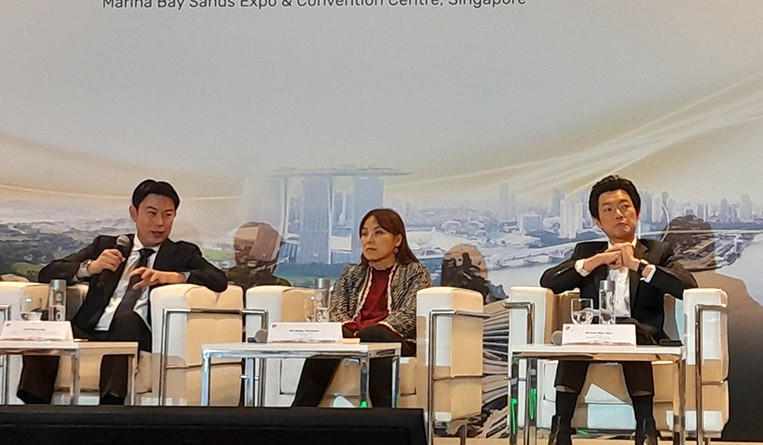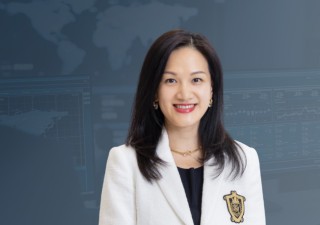IP Week @ SG: Navigating the intersection of technology, trade secrets and legislation
02 September 2024

(From left) Daryl Lim, Welly Tantono and Ren Jun Lim at the panel session “The Open Secret: Embracing Innovation vs. Safeguarding Confidentiality” during IP Week @ SG 2024
With artificial intelligence (AI), including Generative AI (GenAI) and tools like ChatGPT, now widely used and part of industry conversations, as well as ordinary daily discourse, trade secret issues come into play, more so as the world adopts open innovation.
In recent years, stories of data and trade secret leakage involving GenAI systems such as ChatGPT and top-tier global brands have made headlines.
One of these global brands was Samsung. In 2023, the South Korean multinational banned the use of ChatGPT and other AI chatbots among its employees. Reports by Bloomberg indicating engineers accidentally leaked Samsung’s internal source code, which may be stored on servers owned by Microsoft, Google and other operators, prompted the ban.
“In particular with AI, there’s a push for transparency and explainability, and you hand over your algorithms, data sets and source codes. Once it’s out, that leaks into the data, and it’s gone. These are things that data people often don’t think about,” said Daryl Lim, H. Laddie Montague Jr. chair in law, associate dean for research and innovation and founding director of IP law and innovation initiative at Penn State Dickinson Law in Carlisle. Lim shared his insights during the panel session “The Open Secret: Embracing Innovation vs. Safeguarding Confidentiality” during IP Week @ SG 2024 held at the Marina Bay Sands Expo and Convention Centre in Singapore from August 27 to 28, 2024.
Amazon, JPMorgan, Wells Fargo and other leading banks in the United States were in the same boat as Samsung.
To address this problem, governments should put in place strong legal frameworks. However, because of the ever-changing nature of AI and other rapidly evolving technologies, it’s a herculean task for legislative systems to keep up and sync with current innovations. All hope is not lost though. According to Lim, there are several strategies that governments can adopt to manage this dynamic.
Speaking to Asia IP, Lim said that one such strategy is for governments to rely on “soft laws” instead of rigid, detailed rules. These “soft laws” are based on broad principles that apply across various contexts. “This allows flexibility in interpretation as technologies evolve. Singapore’s Model Governance Framework for AI and the ASEAN Guide on AI Governance and Ethics are examples of such approaches,” said Lim.
Governments may also establish regulatory sandboxes for companies to test innovative technologies under a lighter regulatory regime. “This allows firms to experiment with innovative financial products and services in a controlled environment with relaxed regulations, promoting innovation while ensuring consumer protection. It also helps regulators understand new technologies in real-time and adapt laws accordingly,” explained Lim.
Regulatory responses can also be adaptive. Lim cited The Federal Trade Commission, which has used broad principles under the Federal Trade Commission Act to regulate unfair or deceptive practices in privacy and data security.
Governments may also encourage companies to put in place technologies that automate compliance checks and real-time monitoring of legal obligations.
“Second, lawmakers need to work closely with industry experts to understand critical and emerging technologies. This collaboration ensures that legal frameworks are grounded in the realities of technological innovation and are socially accepted,” continued Lim.
He emphasized the need for transparency when updating laws. Transparency will allow public input and scrutiny, which can lead to more robust and well-accepted legal frameworks.
“Third, we should aim for international harmonization and cooperation where possible. UN agencies like WIPO or think tanks like the World Economic Forum can help coordinate efforts to create global legal standards for emerging technologies,” he added.
Additionally, countries can collaborate bilaterally or multilaterally, especially for technologies like AI, blockchain and digital currencies that operate across borders. “The U.S. has worked with the European Union to create frameworks like the EU-U.S. Privacy Shield, though it was later invalidated, and is working on a successor to facilitate cross-border data transfers while respecting different privacy regimes,” said Lim.
“In the U.S., trade secret is big business,” he revealed during the IP Week @ SG panel session. “Why? America has got a very extensive pre-trial discovery system. It also has a very generous damages system. And you can do it at a state level, you can do it at a federal level. I think we’re looking at damages in the US$80M, US$90M range. This year, there were damages in the US$400M range. And if that were not enough, the U.S. says: ‘Whenever your trade secret gets misappropriated, come to us. We will recognize extraterritorial damages [when necessary].’”
Lim capped off his statements during the panel session by saying now is the right time to help businesses, especially small- and medium-sized enterprises (SMEs), and encourage them to start thinking about the value of trade secrets as both national and international business strategies.
“Navigating the intersection between technology and legislation can be particularly challenging for SMEs and startups, given their limited resources,” admitted Lim. “However, there are several strategies these companies can adopt to effectively manage this landscape.”
Still speaking to Asia IP, Lim advised SMEs and startups to stay current as far as relevant laws and regulations are concerned. One low-cost way of doing this is by subscribing to industry newsletters, attending webinars and participating in professional networks. “For instance, the USPTO and IPOS websites are comprehensive, easily navigable and provide information on networking and informational events. Tools like Thomson Reuters’ Regulatory Intelligence offer comprehensive coverage of regulatory changes across multiple jurisdictions, automating the monitoring of global regulatory developments and helping organizations stay compliant by providing alerts on relevant changes,” shared Lim.
Startups and SMEs should also take advantage of existing government assistance schemes as well as regulatory sandboxes to test new products or services in a controlled environment with fewer regulatory risks. Regulatory sandboxes are particularly useful for the fintech and healthcare industries.
Engaging in public policy by participating in consultations, submitting feedback on proposed regulations or lobbying for favourable legislative changes is another strategic measure for SMEs. “Positioning themselves as thought leaders in their industry by publishing articles, speaking at conferences or participating in panels on technology and regulation not only builds credibility,” Lim noted, “but also influences the regulatory conversation.”
He also mentioned the Singapore FinTech Association (SFA), which helps shape regulations in the fintech space and provides members with resources to navigate regulatory challenges. To do this, SFA works closely with regulators. Another is The Startup SG Network which connects startups with government initiatives that influence policy-making.
Aside from Lim, the other speakers at the panel session were Ren Jun Lim, principal at Baker McKenzie Wong & Leow in Singapore, and Welly Tantono, group general counsel at Secretlab (manufacturer of ergonomically designed chairs, desks and accessories for gamers and hybrid workers).
- Espie Angelica A. de Leon, reporting from Singapore






